The State of Mortgages in the UK
Last updated on 30 July 2024
Within the current financial climate, homeowners across the nation are facing a 'cost-of-owning crisis', with thousands of homeowners falling into negative equity this year due to decreasing house prices within the UK.
According to The National Institute of Economic and Social Research (Niesr), 50,000 UK homeowners fell into negative equity in August of 2023, following Nationwide’s announcement that house prices had fallen at the fastest rate in 14 years.
To understand the types of mortgage rates and how much mortgage repayments have increased and rates have changed, Equifax has surveyed more than 2,000 respondents in the United Kingdom - who either have a mortgage or are planning on purchasing a home with a mortgage - to reveal the *state of mortgages.
Our research has also investigated how the current turbulence of rising mortgage rates is impacting the nation, including its emotional impact on current homeowners facing repayment increases and its future impact on Brits who are looking to purchase a home.
Before diving into the specific impacts of the current rise in UK interest rates, it’s important to look at the phenomenon in the context of other rate increases. The UK has experienced several fluctuations in interest rates over the years, with each period having distinct effects on the housing market and borrowers’ attitudes.
A Historical Perspective
Interest rate hikes are not new to the UK. For example, a look back at the early 1990s paints a picture of how significant rate increases can create a cascade of challenges for current and potential mortgage holders.
During the early 1990s, interest rates surged as high as 15%, placing immense pressure on many borrowers. Many faced the prospect of defaulting on loans, experiencing the tumult of repossessions, and seeing their credit scores decline due to the inability to make timely repayments. The housing market saw a dip, with property values plummeting. For prospective homeowners, the dream of owning a home became more elusive as mortgage approvals became highly stringent, and the cost of borrowing rose.
Key Implications for Borrowers Whenever Rates Increase Steeply
When interest rates rise, borrowers face a multifaceted challenge. For those on variable or tracker mortgages, the immediate increase in monthly repayments can be financially debilitating. Fixed-rate mortgage holders are somewhat protected from the hikes until the end of their mortgage term. However, they too face uncertainty when renegotiating their mortgages in a high-interest environment.
Furthermore, sharply increasing rates can make homeownership feel out of reach for many prospective house buyers. Moreover, the increased rates can have a cooling effect on the property market, with demand waning in the face of higher borrowing costs.
Against this backdrop, we can delve deeper into the current landscape of rising interest rates in the UK and their specific impacts, as now revealed by research conducted by Equifax.
Leading mortgage considerations by age demographic
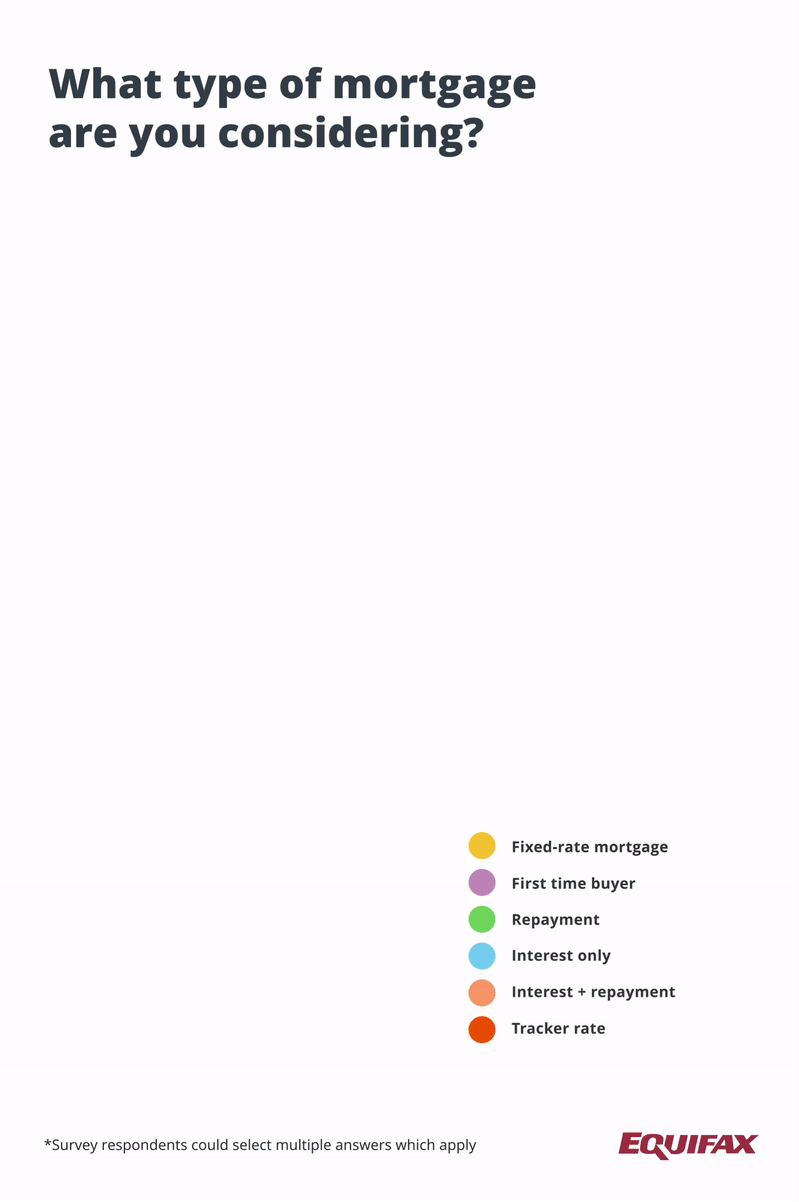
Understandably, the most popular age group considering a first-time buyer mortgage are 18 - 24-year-olds (40%), compared with 35 - 44-year-olds naturally opting for a fixed-rate (35%) mortgage the most.
The average Brit has over £170,000 left to repay on their mortgage
When analysing the data, the average Brit surveyed has £172,290 left to pay on their mortgage. However, this differs greatly between regions, genders and age groups. Our survey insights reveal that more than a quarter (26%) have just £50,000 to £100,000 left to pay.
Breaking the data down even more so, Londoners have £263,948 on average to repay. When analysing genders, women have the least amount of mortgage to pay back at £148,310, with men at £202,469.
Contrary to the above, nearly one in five (17%) are not planning to purchase a home with a mortgage in the future, with females being more likely to not do so (19%).
How much are future homeowners considering borrowing for a new home?
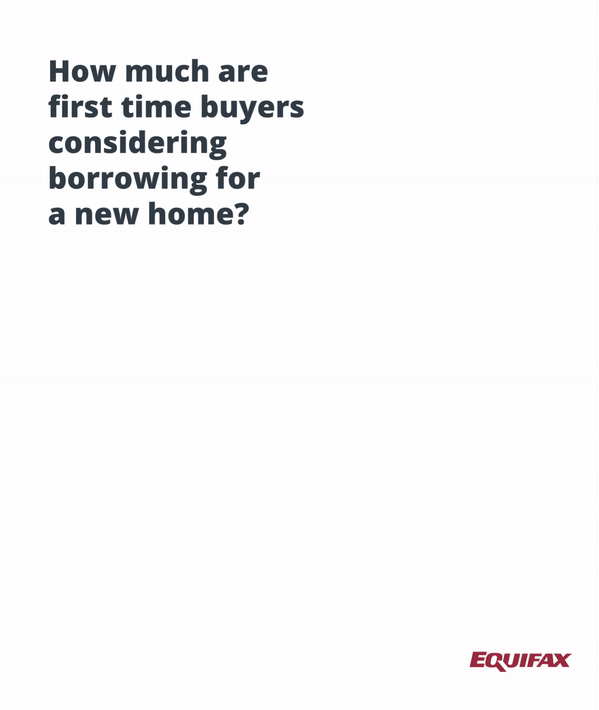
When it comes to reviewing the rising interest rates in the UK, our data shows a staggering four-fifths of British homeowners are worried about rising rates (82%), with over half feeling anxious about hiking interest. Our data shows 25 to 34-year-olds are the most concerned about rising interest rates, with more than two in five (41%) stating they are ‘very worried’.
Rising interest rates are leaving Brits anxious (53%), frustrated (42%) and hopeless (28%)
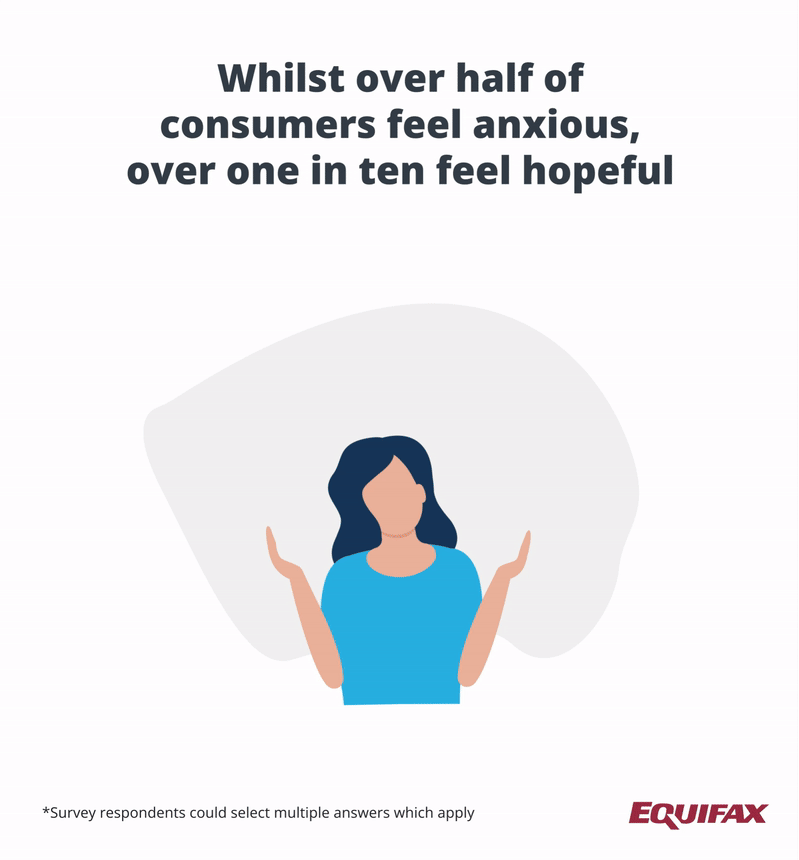
In terms of fixed-rate mortgages, nearly seven in 10 (67%) of Brits are concerned about them ending, with Brightonians being the most worried about this (81%). From a regional point of view, nearly four in five (79%) of people within the North East are concerned the most.
How soon are UK homeowners fixed-rate mortgages ending?
For the majority of British homeowners surveyed (15%), their fixed-rate mortgages won’t end for another two years. However, another 15% said their fixed rate ends in 12 months, and for more than one in 10 people (11%) their fixed rate ends in the next six months.
Given the financial strain of mortgage repayments that many face in the current environment, the question of taking a mortgage break or mortgage holiday is a pertinent one. However, the majority of respondents are stoic, with 57% saying they wouldn’t contemplate a mortgage break. Of those surveyed, females were less likely to take a mortgage break (74%) than males (61%).
That said, several key demographic differences appear, with younger generations far more inclined to put payments on hold for a period. In stark contrast, the majority (84%) of those aged 55+ state they'd never consider taking a mortgage break.
*Percent of respondents who have taken a mortgage break in the last year, or considered doing so
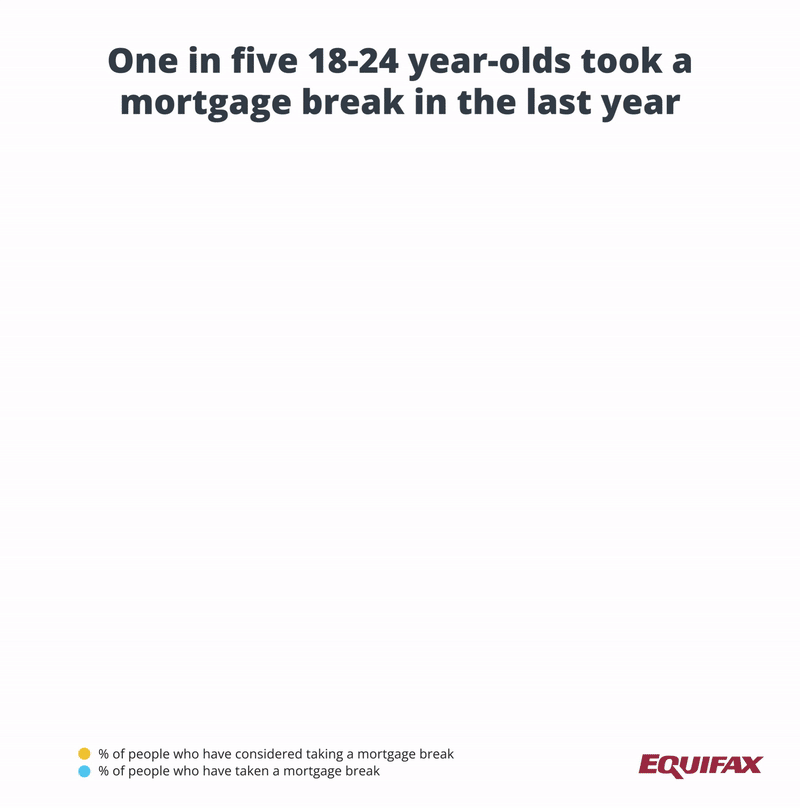
How are interest rate hikes affecting future property purchasing plans?
Recent hikes in interest rates are affecting Brits’ future plans too - specifically when it comes to purchasing a property. So much so, that almost three in ten (28%) have paused all activity associated with moving house for the foreseeable future. As little as one in ten (11%) have not been affected by the interest hikes.
Our survey asked Brits how much their monthly mortgage repayments have changed - on average, repayments have increased by a staggering £461.00. As a first-time buyer, when purchasing a property can be hard, the average 18-24-year-old has seen a £526.00 monthly increase.
The average monthly mortgage repayment has gone up by £461.00 since September 2022
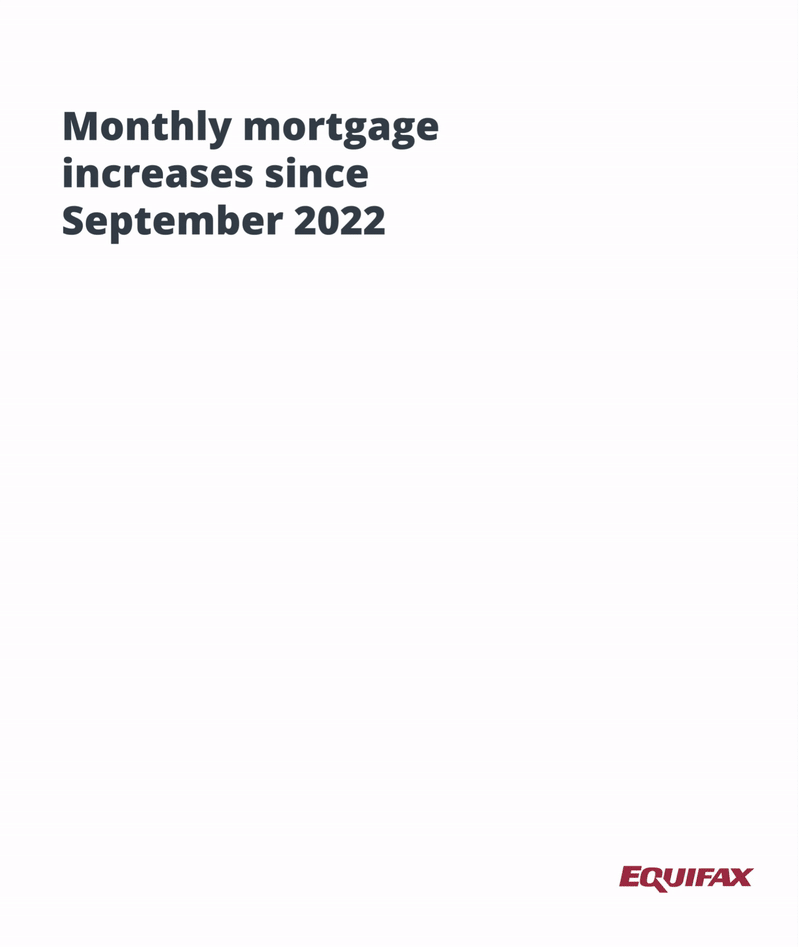
Of the respondents analysed, nearly three in five (57%) said their monthly mortgage repayments have increased since last year, which can considerably affect financial stability, especially during a cost-of-living crisis.
How to find help managing your mortgage
The recent rises in mortgage rates have been a source of considerable challenge and stress for many across the UK. If you or someone you know is struggling with their mortgage, there are a range of free helplines and resources you can consult for advice.
- MoneyHelper: This free service provides clear advice and information to help homeowners navigate mortgage concerns.
- Citizens Advice: Specialised advisors are available to guide you through times of financial change or hardship.
- Mortgage Advice Bureau: Get personalised advice tailored to your individual circumstances to understand the best options and chart a way forward for your mortgage.
- The Money Charity: This charity provides education, information and advice on a range of financial matters.
Equifax’s Homebuyers Handbook also contains a variety of useful information for current and prospective mortgage holders alike.
If your mortgage has seen an increase in repayment costs, Equifax can offer advice on mortgage holidays as well as a guide on how mortgage repayments work if you are a first-time buyer. With the right support and guidance, UK homeowners can navigate the complexities of rising interest rates and make informed decisions to protect their financial well-being.
*Methodology
Equifax conducted a survey with Censuswide with a sample of 2,069 respondents over 18 who either have a mortgage or are planning on purchasing a home with a mortgage, between 26.09.2023 and 29.09.2023. Censuswide abide by and employ members of the Market Research Society which is based on the ESOMAR principles and are members of The British Polling Council.
This article was written on 30 July 2024; all information was correct at the time of writing.
Related Articles
- What is a commercial mortgage
- What is a mortgage holiday?
- What is a mortgage broker?
- How much can I borrow for a mortgage?
- What is a tracker mortgage?
- Getting a second mortgage and buying a second home
- What does freehold mean?
- What credit score is needed for a mortgage?
- What is a 95% mortgage?
- Stamp duty on new builds
- Stamp duty on second homes and buy-to-let properties
- Stamp duty for first-time buyers
- Stamp Duty Land Tax (SDLT) explained
- What to do if you’ve been rejected for a mortgage
- What is a mortgage?
- Can you apply for a mortgage with credit card debt?
- What to ask estate agents when purchasing a property
- Can I apply for a mortgage in retirement?
- What is porting a mortgage?
- What is a joint mortgage?
- Offset mortgages explained
- What is a mortgage in principle?
- Purchasing property with friends
- Costs and fees to consider when you’re buying a home
- Getting a no deposit mortgage with bad credit
- Do you have Right to Buy on your council home?
- Saving for a mortgage deposit
- What is a mortgage interview?
- How do credit scores affect mortgages?
- What to consider when applying for a mortgage if you’re self-employed
- Buying property – what is conveyancing?
- Buying a property – what is gazumping?
- Types of home improvement loans
- What happens to a mortgage after death?
- Getting credit-ready before applying for a mortgage
- How do mortgage applications work?
- Selling property – what to ask estate agents
- Selling property – estate agents vs doing it yourself
- Buying a leasehold property
- Help to Buy: equity loan
- London Help to Buy
- Mortgages for self build and custom build homes
- Help to Buy: Shared Ownership
- What is a Help to Buy: ISA?
- Resources for first-time buyers
- Buy-to-let mortgages explained
- What is remortgaging?
- How mortgage repayments work
- Understanding Mortgages
- Types of Mortgages
- Mortgage rates & decision
- Homebuyer's guide